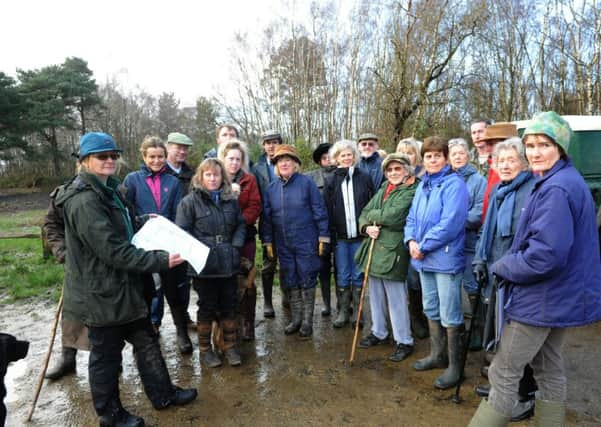Angry farmers blast Sussex Wildlife Trust over bovine tuberculosis


They gave evidence to a three day public inquiry at Cowdray Hall in Easebourne into the trust’s proposals.
The trust claims grazing cattle is a centuries old technique that benefits a wide variety of wildlife. It says despite current management Iping Common is not in optimum condition for the rare heathland species for which it is nationally important.
Advertisement
Hide AdAdvertisement
Hide AdBut farmers in the Midhurst area are still reeling from the consequences when a SWT cow tested positive to bovine tuberculosis (bTB) on Stedham Common last year and they fear they could be hit again if the trust is allowed to carry out its plans to move cattle onto Iping and Trotton Commons.
They were subjected to a lengthy series of nail biting bovine TB testing and restrictions banning them from moving cattle and some were left with hefty bills.
Appearing for objectors including Stedham and Iping and Trotton and Chithurst Parish Councils as well as farmers, walkers and horse riders Lucy Petrie, an Iping resident, told the inquiry inspector Peter Millman: “The bTB outbreak had dreadful consequences for our farming community.”
Focussing on two of the many farmers who were affected, she said Doekele Terpstra at Minsted had been unable to move cattle from February last year until three weeks ago.
Advertisement
Hide AdAdvertisement
Hide Ad“He has been pouring milk down the drain. Doek is a tenant dairy farmer struggling with low milk prices to pay his rent and other bills. He has had 31 cows slaughtered - these are cattle he bred on the farm, never been off it, some were in calf.”
She said: “None of that helped him when the SWT cow brought bTB to Stedham Common.”
It cost him £100,000 in lost cattle, most milk sales and vets fees.
Peter Stent and his wife, both 82 years old, at Pitsham was also in the exclusion zone: “they can’t round up 300 young bullocks without help. They have to pay for this and the inability to move these cattle without further testing when they are ready for sale. Peter asked SWT for a financial contribution to his costs and was turned down.”
Advertisement
Hide AdAdvertisement
Hide AdThe outbreak damaged the reputation of the SWT among the farming community, claimed Mrs Petrie.
She said SWT did not inform parish councils or the local farmers ‘in a timely manner’ about the outbreak and the restriction zone was not put in place until eight weeks after SWT were informed of the bovine tuberculosis.
“The SWT’s introduction of bTB,” she said, “had financial implications for farmers which threatened their livelihood and the roofs over their heads.”
She said it had taken farmers a level of ‘anger, tinged with despair’ to turn up and speak at the inquiry.
Advertisement
Hide AdAdvertisement
Hide Ad“The breakdown in trust between SWT and so many of the local users of the commons is deeply distressing and completely counter productive for conservation.
“We know that if the common is fenced our lives will change, the next generation of our children will no longer be able to play on the common as the previous one did.
She added: “The SWT may well win the right to fence but the reputational damage to their organisation has been profound.”
She did not believe the grazing experiment, against the wishes of the community, could succeed in the hostile environment.
Advertisement
Hide AdAdvertisement
Hide AdSussex Wildlife Trust had ‘immense sympathy’ for farmers said its solicitor Matthew Boyer.
“The outbreak at Stedham and its serious consequences are matters of the greatest concern to it.”
He said the only expert witness called made it clear the chances of a reoccurrence were extremely small, but following a change of policy by the SWT the chances were now even smaller.
SWT cattle were subject to exactly the same regime of testing and control as commercial herds - the trust’s herd management went further than the law required.
Advertisement
Hide AdAdvertisement
Hide AdThe cow which tested positive on Stedham Common had undergone seven pre-movement tests, all of which were negative. He said SWT had now adopted a policy of no longer bringing cattle from any ‘high risk area’.
“The largest number of cattle likely to be used at Iping and Trotton is between 15 and 30 and they will not come from East Sussex, and they will not be rotated to other sites outside West Sussex. Animals that have to be returned to East Sussex for will have to stay there.”
Grazing would bring benefits to a wide range of commons users, claimed Mr Boyer.
“The vegetation underfoot at much of Iping and Trotton commons, except on paths, is tussocky and difficult to walk across. There are dense stands of ‘Molinia’ grass that are neither pleasant for recreation nor beneficial to biodiversity.
Advertisement
Hide AdAdvertisement
Hide Ad“Grazing over time will help to arrest the spread of Molinia and will help to restore not only the conservation interest of the site, but its accessibility to the public.”
Inherent in the plan was the desire to restore an ancient landscape complete with an age-old low intensity grazing regime. “This is a benefit to the neighbourhood in its own right.”
Don’t miss out on all the latest breaking news where you live.
Here are four ways you can be sure you’ll be amongst the first to know what’s going on.
1) Make our website your homepage
2) Like our Facebook page
3) Follow us on Twitter
Advertisement
Hide AdAdvertisement
Hide Ad4) Register with us by clicking on ‘sign in’ (top right corner). You can then receive our daily newsletter AND add your point of view to stories that you read here.
And do share with your family and friends - so they don’t miss out!
Always the first with your local news.
Be part of it.